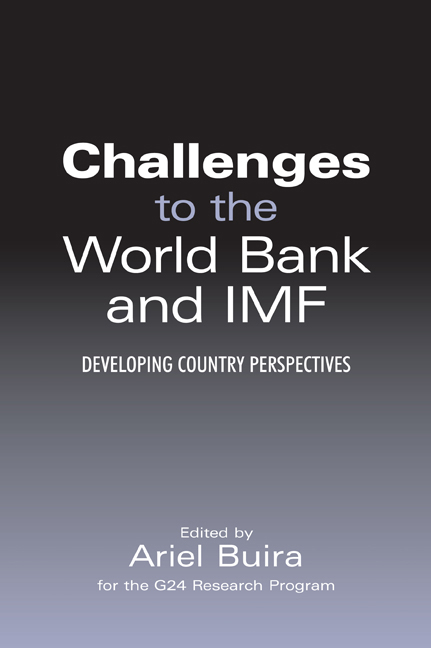Book contents
- Frontmatter
- Contents
- Contributors to this volume
- Foreword
- Introduction
- 1 The Governance of the IMF in a Global Economy
- 2 Who pays for the IMF?
- 3 An Analysis of IMF Conditionality
- 4 Achieving Long-Term Debt Sustainability in Heavily Indebted Poor Countries (HIPCs)
- 5 The Poverty Reduction Strategy Paper Approach: Good Marketing or Good Policy?
- 6 Capital Management Techniques in Developing Countries
- 7 International Reserves to Short-Term External Debt as an Indicator of External Vulnerability: The Experience of Mexico and Other Emerging Economies
- 8 Mechanisms for Dialogue and Debt-Crisis Workout that Can Strengthen Sovereign Lending to Developing Countries
- 9 Developing a Global Partnership for Development
- 10 International Financial Institutions and International Public Goods: Operational Implications for the World Bank
- Index
5 - The Poverty Reduction Strategy Paper Approach: Good Marketing or Good Policy?
Published online by Cambridge University Press: 10 September 2020
- Frontmatter
- Contents
- Contributors to this volume
- Foreword
- Introduction
- 1 The Governance of the IMF in a Global Economy
- 2 Who pays for the IMF?
- 3 An Analysis of IMF Conditionality
- 4 Achieving Long-Term Debt Sustainability in Heavily Indebted Poor Countries (HIPCs)
- 5 The Poverty Reduction Strategy Paper Approach: Good Marketing or Good Policy?
- 6 Capital Management Techniques in Developing Countries
- 7 International Reserves to Short-Term External Debt as an Indicator of External Vulnerability: The Experience of Mexico and Other Emerging Economies
- 8 Mechanisms for Dialogue and Debt-Crisis Workout that Can Strengthen Sovereign Lending to Developing Countries
- 9 Developing a Global Partnership for Development
- 10 International Financial Institutions and International Public Goods: Operational Implications for the World Bank
- Index
Summary
Abstract
I begin by posing a key question: Has the Poverty Reduction Strategy Paper (PRSP) process yielded benefits that exceed its considerable administrative costs? I first review the PRSP process and then examine some of the existing reviews, explain why these reviews tend to fall short of their goals, and finally try to answer the question stated above. I find that the first round of reviews of the PRSP approach have been dominated by little careful quantitative analysis, and instead by anecdotes and stories. I recommend that the future reviews of the PRSP process, from all sides, confront the difficult task of determining the marginal impact of the PRSP approach. I also present a detailed list of the types of household data that are needed for a successful PRSP implementation. I conclude with a specific suggestion: The Bank and the Fund or an NGO should undertake one careful, detailed and rigorous analysis of a specific PRSP process based on a multiple waves of a household survey, which can then serve as a model for future reviews and analyses.
1. Introduction
In 1999, the World Bank and the International Monetary Fund (IMF) adopted a new set of policies to guide lending to some of the world's poorest countries. Amid the blizzard of acronyms explaining the new policies, the Bank and the IMF laid out a framework to be followed by poor countries wishing to make use of various concessionary (low-cost) lending facilities. About two and a half years later, in the spring of 2002, the Bank and the IMF concluded a review of these policies. Contributors to this review included dozens of non-governmental organizations (NGOs) as well as the Bank and the IMF themselves. The Bank and the Fund, while acknowledging that the process could be improved, concluded that it worked pretty well based on the preliminary evidence so far available. The NGOs were, on the whole, less enthusiastic.
My reading of the record is that neither the Bank nor the outside commentators are asking the hard questions. The right question to ask is the following:
Relative to what would have happened absent the adoption of the Poverty Reduction Strategy Paper (PRSP) framework, has the implementation of the PRSP process yielded benefits that exceed its often considerable administrative costs?
- Type
- Chapter
- Information
- Challenges to the World Bank and IMFDeveloping Country Perspectives, pp. 119 - 140Publisher: Anthem PressPrint publication year: 2003



